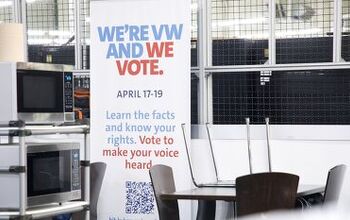Death Train Vs Safe Car Sales Hypothesis Gains New Evidence

As assembly plants cautiously fire up and buyers slowly return to the new vehicle market in North America, automakers have their fingers crossed, hoping that an increase in demand from frightened first-time buyers will offset lost sales from both the newly jobless and hard-hit rental agencies.
Data out of Europe and China seems to suggest the fright factor is real, but just how much (and for how long) automakers can depend on it really depends on the virus itself.
If the virus dies off, or if a fantastic new vaccine or sure-thing treatment comes along, we’re back to normal. However, if predictions by epidemiologists pan out, we’ll be in the grip of this pandemic for some time. Taking public transit will, for some, hold all the appeal of stripping naked and running blindfolded through a barbed wire factory.
In Germany, a country that held the virus at bay far better than some of its neighbors, certain companies are forbidding employees from taking transit to work, Bloomberg reports. In France, Patrick Pouyanne, CEO of French oil giant Total, sees a resurgence in the popularity of driving as a remedy for the current oil glut and a way to boost demand (and prices).
Like Pouyanne, Josu Jon Imaz, head of Spanish oil company Repsol, also anticipates increased fuel demand from drivers in the coming months and a corresponding drop in public transit use.
The hypothesis that many people will do everything in their power to avoid sharing enclosed spaces with strangers is backed only by circumstantial evidence in the West, given that lockdown orders in Europe and North America are only just beginning to ease. It will take months of “returning to normal” before solid proof rolls in. Still, Apple Maps driving-direction queries suggest a significant decrease in transit use when compared to driving — Berlin, for example, recently showed transit ridership down 61 percent, with driving down only 28 percent. Madrid, Spain showed transit use down a steady 87 percent, with driving rising to 68 percent below normal levels.
Data from Ottawa, Canada shows transit ridership down 80 percent, same as a month ago, with driving down only 40 percent — a 20-percent increase from a month prior.
In the viral epicenter of China, which saw lockdowns starting in mid-January and was first to roll them back, firmer evidence can be found.
Data amassed by BloombergNEF shows that traffic levels in the megacities of Beijing, Shanghai, and Guangzhou are now higher than levels seen last year. In comparison, volume on the three cities’ metro systems has fallen 53, 29, and 39 percent, respectively. These cities are back to work in earnest, and the divide between personal car use and transit volume can’t be ignored.
The arrival of summer and the ongoing easing of lockdown orders should add wind to automakers’ sales, and perhaps give rental agencies who really push their sterilization efforts a boost. In no way, however, does anyone expect a resurgence in the love of car commuting to make up for the loss of so many new vehicle sales during the March-May period.
[Image: F11photo/Shutterstock]

More by Steph Willems
Latest Car Reviews
Read moreLatest Product Reviews
Read moreRecent Comments
- Theflyersfan After looking it over, Honda, I want royalties for this one: The Honda Yawn.
- V8fairy Not scared, but I would be reluctant to put my trust in it. The technology is just not quite there yet
- V8fairy Headlights that switch on/off with the ignition - similar to the requirement that Sweden has- lights must run any time the car is on.Definitely knobs and buttons, touchscreens should only be for navigation and phone mirroring and configuration of non essential items like stereo balance/ fade etc>Bagpipes for following too close.A following distance warning system - I'd be happy to see made mandatory. And bagpipes would be a good choice for this, so hard to put up with!ABS probably should be a mandatory requirementI personally would like to have blind spot monitoring, although should absolutely NOT be mandatory. Is there a blind spot monitoring kit that could be rerofitted to a 1980 Cadillac?
- IBx1 A manual transmission
- Bd2 All these inane posts (often referencing Hyundai, Kia) the past week are by "Anal" who has been using my handle, so just ignore them...

































Comments
Join the conversation
For a short time in about 1963 I more or less lived in the Boston MTA subways, boy howdy was it ever nasty ~ you'd be lucky if they ever took out the trash, forget about cleaning up anything . The subway, trolleys and buses in Los Angeles are some of the cleanest I've ever ridden, still jam packed with crazies, druggies and sexual predators though . When I'm vacationing I often take the local bus to see the town and get a feel for it . -Nate
I have been teleworking off and on for over 20 years. Since 2001 I live about 16 miles from downtown Cincinnati and up until 2 months ago I was required to go into the office once a week--I haven't been in the office for about 2 months now due to the Covid-19. Before I moved closer I lived in the country which required me to drive 30 miles to work each day (60 miles round trip). I would put at least 15k miles a year on each vehicle and now I am lucky to drive 3k miles a year and now since Covid-19 even less. Not that interested in buying a new vehicle especially since my highest mileage vehicle has 49k miles and is 8 years old. I have a 2013 CRV with 23k miles and a 2008 Isuzu I-370 with 31k miles. I get much more work done at home and spend less time having to commute and dress for work. I have not only saved money on vehicles but have saved money on food, clothing, and other items that I normally spend on. I believe telework will be expanded especially when most employers discover the savings on less office space and more productivity. My employer has reduced their office space to a quarter of what it was saving about 3 million a year in costs.